
How Russia Was Pushed into Revolution
/ Главная / Russkiy Mir Foundation / Publications / How Russia Was Pushed into RevolutionHow Russia Was Pushed into Revolution
This year Russia marks the one hundred year anniversary of the 1917 February Revolution. In Soviet times it was called a “bourgeois democratic revolution” (as opposed to the socialist October Revolution), but now more and more historians are inclined to view these events as a successfully planned сoup. The publicist and historian Aleksandr Gorianin reflects on what this February Revolution actually was.
A Year Before the Bolsheviks
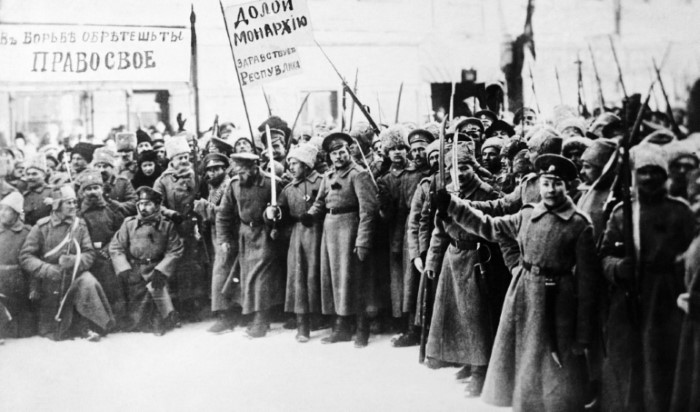
The February Revolution
“The supply bottlenecks have been worked out,” as they said back then, for delivering much-needed military supplies from Russia’s allies: the Romanov-on-Murman port (now called Murmansk) and the Murmansk railroad have been built, and the construction of a bridge across the Amur river has opened a road from Chita to Khabarovsk, which means that a Trans-Siberian thoroughfare runs entirely through Russian territory. The harvest has been successful this year: the livestock population has grown and the deficit of farm workers is bearable, especially since prisoners-of-war are now being used for farm labor. Interruptions to the food supply occur from time to time in various parts of the empire due to congested lines of transportation, but these are not critical problems. If nearly all food supplies are being rationed and are largely composed of substitute foodstuffs in Germany, Russia has only begun rationing sugar (since August 1916) and isn’t even thinking about such substitutions. In the cities the military manufacturing allows for a postponement of army service, meaning that while there might not be a surplus of labor, but there is enough of it. What’s more, even when adjusted for inflation, workers’ incomes have risen by 9% between the years 1914 and 1916. Support payments have remained in place for the families of mobilized workers: 100% for those with children, and from 50%-70% for those without.
A new uniform was sewn for the Russian Army’s spring offensive according to the pictures of Viktor Vasnetsov—soon the stockpile of these uniforms would be acquired by the Red Army, and its helmet-like headwear would be named after the Soviet commander Budyonny (poor Vasnetsov!). But most importantly, until the end of October 1916 it seemed that Russia’s political parties were conducting themselves reasonably—just like their colleagues in other warring countries. Sitting in Zurich, Lenin lamented that an old man like him (he was 46) would not see the end of the Russian autocracy and wrote about the deathly political quiet shackling Europe.
A Coup, Not a Revolution
Memoirs by contemporaries and minor participants reveal that the February Revolution was the result of a conspiracy by those at the top. This also emerges in their letters and diaries. (Once they realized what they had done, the main participants either modestly denied their authorship or expressed themselves only indirectly for the rest of their lives.) The participants in this conspiracy were not interested in compromise or even a temporary truce with the regime lasting until the end of the war—which demonstrates their exceptional political naivety. (And this is a generous explanation—we won’t mention the less generous ones.) As strategists and thinkers, they had not outgrown even the simplistic populists of the nineteenth century. “A purely negative relationship to the government, systematic opposition, is a sign of the infantilism of one’s political thought.” So the classic thinker of Russian liberalism, the “father” of constitutional rule in Russia, Boris Chicherin, tried in vain to instill in his political heirs (who, it turns out, weren’t really heirs at all).
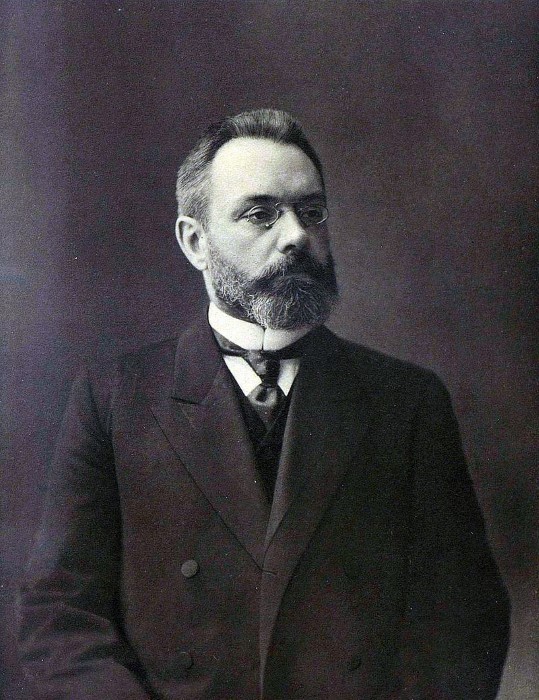
February Flash Mob
Not long before the disruptions started, on 14 February 1917, Kerensky pronounced from the tribune of the Duma: “The historic task of the Russian people at the present moment is the task of eliminating a medieval regime without delay, whatever the costs.” How could this be possible in the parliament of a warring country? The newspapers joyfully seized upon such words, and they were read in the trenches. Such speeches were hardly accidental—they clearly were part of the conspirators’ script for bringing about a palace coup, and they were spoken in order to “prepare” the country. At a time of war!
The conspirators hurried, hoping to forestall the tsar’s order about “responsible government.” This document had already been signed by the Emperor and lay on the desk of the Minister of Justice, Nikolai Dobrovolsky, who had been appointed recently (20 December 1916). This order was to be publicized on Easter (2 April). Did the Emperor want for his concession to the opposition to look like a conciliatory gift for the holiday, an Easter egg, and therefore a little bit less of a concession at the end of the day?
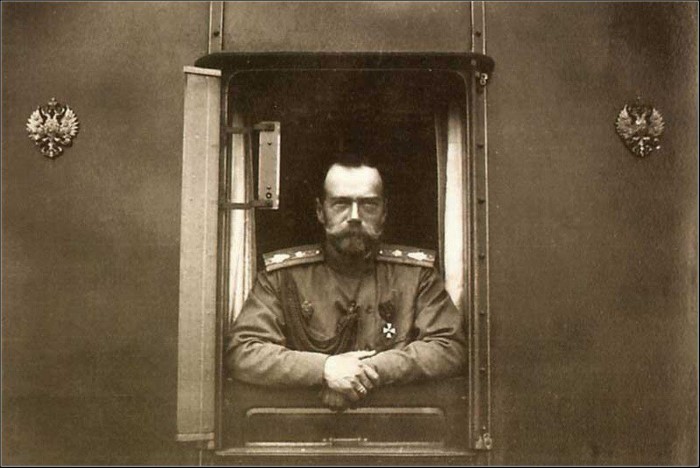
Nikolai II at the Dno railway station a day before his abdication
There is shocking evidence that the February Revolution began as a well-organized flash mob (of course, such a concept didn’t exist then). The Petrograd city administrator, General Alexander Balk, describes the events of the International Women Workers’ Day (23 February, or 8 March by the new calendar)—when a women’s protest was organized in Petrograd (the workers in Vyborg joined in later)—in the following way. The traffic along Liteyny and Nevsky Avenues, writes the general, “was unusual, calculated. The points of convergence were Znamenskaya Square, Nevsky Avenue, and the State Duma. There were many ladies in the crowd… A thick crowd slowly and peacefully moved along the sidewalks, had lively conversations, laughed, and around two o’clock one could hear plaintive, suppressed voices: “bread, bread.” And so it was everywhere all day. The crowd sort of moaned, “bread, bread.” But their faces were lively, cheerful, and apparently satisfied by what they thought was a clever pretext for protesting…There was no famine. People could get whatever they needed...It was enjoyable for them to put the police in a stupid and ridiculous position. And in this way a number of entirely loyal people, and especially young people, unconsciously paved the way for the bloody events that have played out over the past days.”
By pure coincidence certain mysterious humanitarian funds came up with money on hand to give to the active participants in the demonstrations as a reward. By pure coincidence some rails on the Finland railroad turned out to be loose, and this delayed the arrival of loyal units to the capital from Finland.
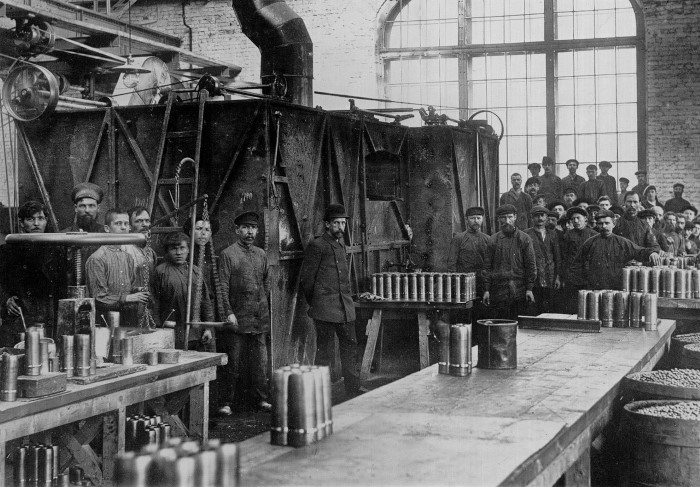
Workers at the Putilov factory making shrapnel
Sadly, the confusion in people’s minds was not helped by the position of the Holy Synod. When Petrograd was besieged by demonstrations and unrest in the streets—especially from 24 February on—the Synod passed up the opportunity to turn to the faithful with an appeal that would have been read in churches and posted on the streets. It would have been a forceful warning and carried the Church’s punishment if disobeyed. But the leading member of the Synod, the Kiev Metropolitan Vladimir (Bogoyavlensky) could not forgive Nikolai II for removing him from the capital to Kiev and responded to this suggestion with the following: “This is always how it is. When we aren’t needed, they don’t notice us, but in a moment of danger they turn to us first for help.” And he didn’t agree to make such a declaration in the Church’s name. (The Procurator of the Synod, Nikolai Raev, was absent from the meeting.) Metropolitan Vladimir doubtlessly regretted his words bitterly in the coming days. Less than a year later, soon after the Bolsheviks had taken Kiev, he was brutally murdered outside the Kiev-Pechersk Monastery.
Psychological Confusion
“On 1 March 1917,” Churchill would write later, “the tsar was still on his throne. The Russian Empire and Russian Army were holding on, the front was holding fast, and victory was guaranteed… The system headed by Nikolai II at that moment was winning the war for Russia.” Churchill had in mind 1 March by the Gregorian calendar, that is, 16 February for the Russian Empire. If Nikolai had come to his senses that day, everything could have turned out differently. In any event, the fateful outcome was not predetermined. The tsar could have come to his senses and conducted himself like a man even 13 days later, on 1 March by the old style. He could have simply called his personal convoy into the train car where the traitorous general Ruzsky forced him to abdicate. In any case, Churchill’s words are a good warning to anyone who is prone to delusions about the apparent obviousness of the situation.
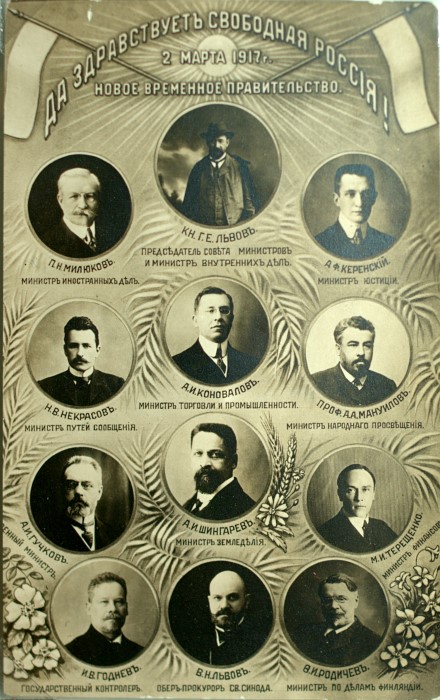
Members of the Provisional Government
However bleak the events of those days may have looked—the Volynsky regiment’s betrayal, the fateful inaction of General Khabalov, the treachery of the rail workers, the undignified behavior of the military command, and even the Emperor’s abdication—they did not lead necessarily and unambiguously to a national catastrophe. There is one other detail, which hasn’t exactly gone without notice but has somehow not got the attention from historians it deserves. On 27 February 1917 the State Duma, which had already been dissolved, gave birth to a new agency not provided for by the law: the Provisional Committee of the State Duma, headed by M.V. Rodzianko, and on 2 March this newly created committee formed the Provisional Government. Nonetheless, this Provisional Government—which had come from within the Duma—broke from the Duma right away. It broke with the agency of popular representation to which it owed its own existence! The Duma had many reasonable delegates, and even the Progressive Bloc was coming to its senses. Perhaps this was the direst of all the mistakes made by the Provisional Government.
In the event of a speedy renewal of the Duma’s work, the monstrous “Order No. 1” that decimated the army would have been completely impossible. So-called “dual power” would have been impossible. So would have been many other fateful events and circumstances. In hindsight, it is unbearable to relive the legal vacuum of those days and weeks even today, a century later. Why didn’t that feeling torment those who were leading events back then—the staunch democrats of the Progressive Bloc? They were evidently certain that they had made the best of an opportunity and taken the shortest path (past the Duma) to become the real power. Feeling themselves to be in power, they stopped hurrying. In so doing, the Provisional Government signed a sentence condemning themselves, Russian parliamentarism, and, in the final analysis, tens of millions of people.
Aleksandr Gorianin
New publications

 Mikhail Kalatozov, a director who transformed the world of cinematography in many ways, was born 120 years ago. He was a Soviet film official and a propagandist. Above all, he was capable of producing movies that struck viewers with their power and poetic language.
Mikhail Kalatozov, a director who transformed the world of cinematography in many ways, was born 120 years ago. He was a Soviet film official and a propagandist. Above all, he was capable of producing movies that struck viewers with their power and poetic language.  Ukrainian authorities have launched a persecution campaign against the canonical Ukrainian Orthodox Church (UOC), the biggest one in the country's modern history. Over the past year, state sanctions were imposed on clergy representatives, searches were conducted in churches, clergymen were arrested, criminal cases were initiated, the activity of the UOC was banned in various regions of the country, and monasteries and churches were seized.
Ukrainian authorities have launched a persecution campaign against the canonical Ukrainian Orthodox Church (UOC), the biggest one in the country's modern history. Over the past year, state sanctions were imposed on clergy representatives, searches were conducted in churches, clergymen were arrested, criminal cases were initiated, the activity of the UOC was banned in various regions of the country, and monasteries and churches were seized.  When Nektary Kotlyaroff, a fourth-generation Russian Australian and founder of the Russian Orthodox Choir in Sydney, first visited Russia, the first person he spoke to was a cab driver at the airport. Having heard that Nektariy's ancestors left Russia more than 100 years ago, the driver was astonished, "How come you haven't forgotten the Russian language?" Nektary Kotlyaroff repeated his answer in an interview with the Russkiy Mir. His affinity to the Orthodox Church (many of his ancestors and relatives were priests) and the traditions of a large Russian family brought from Russia helped him to preserve the Russian language.
When Nektary Kotlyaroff, a fourth-generation Russian Australian and founder of the Russian Orthodox Choir in Sydney, first visited Russia, the first person he spoke to was a cab driver at the airport. Having heard that Nektariy's ancestors left Russia more than 100 years ago, the driver was astonished, "How come you haven't forgotten the Russian language?" Nektary Kotlyaroff repeated his answer in an interview with the Russkiy Mir. His affinity to the Orthodox Church (many of his ancestors and relatives were priests) and the traditions of a large Russian family brought from Russia helped him to preserve the Russian language.

 The leaders of the Friends of the Great Russia cultural association (Amici Della Grande Russia) in Italy believe that the Western policy of abolishing Russian culture in Europe has finally failed. Furthermore, it was doomed to failure from the beginning.
The leaders of the Friends of the Great Russia cultural association (Amici Della Grande Russia) in Italy believe that the Western policy of abolishing Russian culture in Europe has finally failed. Furthermore, it was doomed to failure from the beginning.  Name of Vladimir Nemirovich-Danchenko is inscribed in the history of Russian theater along with Konstantin Stanislavski, the other founding father of the Moscow Art Theater. Nevertheless, Mr. Nemirovich-Danchenko was a renowned writer, playwright, and theater teacher even before their famous meeting in the Slavic Bazaar restaurant. Furthermore, it was Mr. Nemirovich-Danchenko who came up with the idea of establishing a new "people's" theater believing that the theater could become a "department of public education."
Name of Vladimir Nemirovich-Danchenko is inscribed in the history of Russian theater along with Konstantin Stanislavski, the other founding father of the Moscow Art Theater. Nevertheless, Mr. Nemirovich-Danchenko was a renowned writer, playwright, and theater teacher even before their famous meeting in the Slavic Bazaar restaurant. Furthermore, it was Mr. Nemirovich-Danchenko who came up with the idea of establishing a new "people's" theater believing that the theater could become a "department of public education."  "Russia is a thing of which the intellect cannot conceive..." by Fyodor Tyutchev are famous among Russians at least. December marks the 220th anniversary of the poet's birth. Yet, he never considered poetry to be his life's mission and was preoccupied with matters of a global scale. Mr.Tyutchev fought his war focusing on relations between Russia and the West, the origins of mutual misunderstanding, and the origins of Russophobia. When you read his works today, it feels as though he saw things coming in a crystal ball...
"Russia is a thing of which the intellect cannot conceive..." by Fyodor Tyutchev are famous among Russians at least. December marks the 220th anniversary of the poet's birth. Yet, he never considered poetry to be his life's mission and was preoccupied with matters of a global scale. Mr.Tyutchev fought his war focusing on relations between Russia and the West, the origins of mutual misunderstanding, and the origins of Russophobia. When you read his works today, it feels as though he saw things coming in a crystal ball...